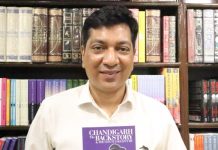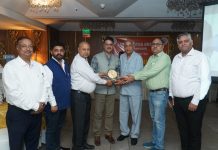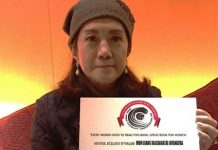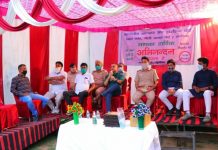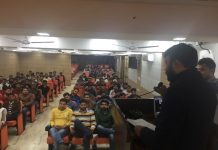
Patiala
5 April 2019
DIVYA AZAD
Heart rhythm disease or “cardiac arrhythmia” is an irregular heart beat due to abnormalities in the electrical system of the heart and shouldn’t be confused with heart attack, which results from the blockage or choking of heart arteries. Understanding of this fundamental difference is the key in management of various heart rhythm related disorders. While speaking to media at Patiala today, Dr Rajat Sharma, a renowned heart rhythm specialist at the Heart Rhythm and Cardiac Pacing division at Fortis Hospital, Mohali, announced the opening of a dedicated heart rhythm clinic in the city.
Dr. Sharma said, “These heart rhythm disorders may result in a too fast, slow or otherwise irregular heartbeat. This results from extra electrical fibres or channels within the heart from birth or due to short circuiting within the heart due to scarring from a prior heart attack, infections, or certain genetic conditions.”
He added, the electrical abnormalities of the heart leading to irregular or fast heart beats may be associated with diabetes, hypertension, thyroid diseases, sleep disorders or excessive snoring and obesity. Many drugs, alcohol and stimulants like caffeine in tea and coffee can be related to these conditions but are not the cause for it. But they shouldn’t be confused or equated as heart artery disease. Similarly the natural pacemakers and the electrical wires can have disease, leading to extremely slow heart beats and fainting or dizziness. Lack of awareness of the physicians and the patients results in an inappropriate management. Dr Sharma stressed that any person diagnosed to have abnormal heart disorders must seek a heart rhythm specialist opinion at the earliest. The arrhythmia can be benign or it can be life threatening.
Dr. Rajat Sharma said treatments include burning of the extra electrical wires in the heart or the scar tissues, by application of heat or freezing technique, called RF ablation or cryo ablations respectively. Sometimes the heart rhythm specialist may prescribe specific medications, advanced pacemakers and implantable cardiac defibrillators or devices, to treat these abnormal heart rhythm disorders.
One of the most common irregular heart rhythm disorders is called “Atrial fibrillation” or commonly AF, he said, adding that this is associated with an increased risk of stroke. AF is commonly associated with advance age, high blood pressure, diabetics, sleep disorders, thyroid disease and coronary artery disease. A timely diagnosis and management can prevent a potential crippling stroke, he said.
The most devastating heart rhythm disorder is “sudden cardiac arrest or SCD”. Commonly this condition is wrongly equated with a heart attack. The heart attack results from blockage of heart arteries while a sudden cardiac arrest results from sudden electrical flow within the heart resulting in stoppage of effective heart beat and eventually leading to sudden death. But this too can be prevented if identified and managed appropriately. Prior heart attack with poor pumping function of the heart, heart muscle disease or cardiomyopathies, certain familial genetic heart rhythm disease are associated with an increased risk of SCD. Individuals at high risk of SCD, must be evaluated at a heart rhythm centre, and an appropriate use of an implantable defibrillator or at times RF ablation will be lifesaving.
Dr Sharma, said, heart rhythm disorders like episodic heart racing or fast heart beats, skipped beats can be cured by appropriate heart rhythm interventions or medications. A clear understanding and evaluation of these electrical abnormalities are important for a successful management of these disorders.
Finally , extremely slow heart beats or commonly known as “heart blocks” may be due to disorders of the heart’s natural pacemakers. This is managed by appropriate selection and implantation of artificial pacemakers. Today leadless pacemakers are available to be used in very specific conditions and can be discussed with the heart rhythm specialist. Many newer generation pacemakers are in the pipelines .
Dr Sharma stressed on the awareness and evaluation of fainting attack and its management. He also highlighted on the various familial genetic disorders and their appropriate management. He urged the community and the physicians/cardiologists dealing with such ailments need to be aware about these disorders and resort to the various dedicated clinics managed by the heart rhythm and pacing divisions at tertiary care centres.






